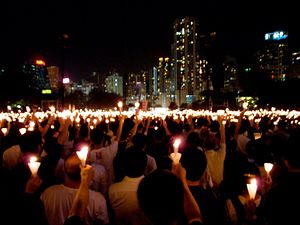On January 16, 2013, I published an article in the daily Hong Kong Economic Journal arguing that if Hong Kong people wanted democracy, they should make civil disobedience their means to this end. Mass rallies alone, I wrote, could never overcome the obstacles that the Chinese Communist Party (CCP) had put in the path of democratic reform. My idea quickly drew wide attention.
In March 2013, I joined Chan Kin-man, a sociology professor at the Chinese University of Hong Kong, and Chu Yiu-ming, a retired Baptist pastor, in initiating the Occupy Central with Love and Peace (OCLP) Movement. The media called us the “Occupy trio.” For many years, Chan worked to establish and support civil society groups in mainland China. Chu, a veteran social activist, was also one of the key organizers of Operation Yellowbird, which had helped many student leaders and other Tiananmen Square protesters to escape from China to Western countries via Hong Kong. The three of us had seen how the Tiananmen Massacre happened. The souls of Tiananmen Square have remained in our hearts, and never far from our thoughts.
In hundreds of public gatherings, the Occupy Central movement highlighted the meaning and importance of universal suffrage. Three rounds of deliberative meetings and a civil referendum in which around 800,000 people voted were our means for framing a proposal to the CCP regarding methods of electing the Hong Kong chief executive. On August 31, 2014, China’s national legislature rejected Occupy Central’s proposal. We then set in motion our plan to take things to the streets.
In late September, high school and college students walked out of their classes and headed for Civic Square, in the area of Central that houses the Hong Kong government offices. The police blocked off the area adjacent to the government headquarters, causing thousands of protesters to spill into major roads nearby. The police used tear gas in an effort to disperse the protesters, but this only brought even more people to join the demonstrations.
The protesters maintained their peaceful occupation. Haunted by the nightmare of the Tiananmen Massacre, my two colleagues and I just wanted to bring everyone home safely. Many protesters, however, had come out on their own rather than in response to the organized Occupy Central movement, and they saw no duty to follow any Occupy Central directions. The students refused to retreat without making any gains for democracy, and the protesters continued to occupy the roads. This went on for days, and the inconvenience it caused began to eat away at public support. Many protesters still refused to leave. In the end, we surrendered ourselves to the police, and after 79 days of occupation, the streets were finally cleared.
The Umbrella Movement of 2014, as this campaign of planned and unplanned protests came to be called, did not meet the tragic fate that the Tiananmen Square protests had suffered in 1989. The Umbrella Movement failed to change the electoral system of Hong Kong, but it reshaped the political culture. People are now much more receptive to civil disobedience as a tool of democratization, and seeds of democracy have been planted in Hong Kong’s soil.
Here, however, a word of caution is in order. Whereas older Hong Kong democrats tend to see hopes for democracy in Hong Kong as tied to hopes for democracy in China, many younger Hong Kong people reject the linkage. They favor self-determination or even full independence for Hong Kong, and may care little whether China ever becomes democratic. Yet feelings cannot override political reality. If democracy gains no ground in China, the chance that Hong Kong can become democratic will be slim.
The souls of Tiananmen Square might not be remembered by many in mainland China, but they have not left Hong Kong. By virtue of its persistence, Hong Kong’s struggle for democracy may have preserved the seeds of change in China. If so, this would not be the first time that Hong Kong has played such a role in Chinese history.
The CCP seems powerful at the moment, but China is at a crossroads. The kinds of cultural changes seen in Hong Kong may be coming to China before long. When the generation that grew up amid unprecedented economic and physical security becomes the pillar of society, the demand for greater political freedom and more self-rule may become unstoppable. When a substantial number of people in China demand democratic change, it will be a moment of great opportunity for Hong Kong’s democracy movement as well. We must do everything we can now to prepare ourselves so we are ready to rise to the challenge of that moment when it arrives.
Benny Tai, who was recently sentenced to 16 months in prison for his role in organizing Hong Kong’s 2014 Umbrella Movement, is associate professor of law at the University of Hong Kong. This essay is drawn from an article in the April 2019 issue of the Journal of Democracy.






























